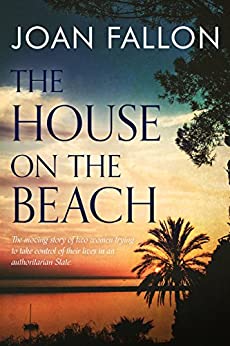Writers Inspiring Change feature author: Joan Fallon
- IWIC Admin

- Jan 29, 2023
- 4 min read
Updated: Jan 30, 2023

Tell us about yourself and what inspired you to write
I started writing fourteen years ago, after completing an Open University course in Creative Writing. I’d been thinking about writing novels for many years, but day to day life, bringing up a family and earning a living had always got in the way. It wasn’t until I moved to Spain to live that I found I had the time to concentrate on what I really wanted to do. Seeing the advertisement for the OU course seemed like an omen to me; I had done an Open University degree back in the 1970s and have a high regard for the establishment. This was obviously going to be my chance. The course gave me confidence and I soon began to write my first novel. But I had started my new career at the wrong time – publishing was changing. After a few years of rejections and a mountain of “We enjoyed your work but …” letters, I decided to self-publish. To date I have self-published fifteen books. This has been an enjoyable journey except for the slog of marketing the books – something I have had to learn and which takes me away from what I really want to do, which is to write new books.
When I lived in England I was first a teacher and later a trainer in management studies, but my love has always been literature. Because my working life, during the 1970s and through to the 1990s, was always that of a woman struggling for recognition in a man’s world, almost all my books have a strong female protagonist. I write a lot about women and the challenges they have to face, because I understand them best. I also like to write about the past, but not kings and queens, rather the social fabric of society. That brings me to the second influence on my writing, the fact that I have lived in Spain for the last twenty-three years. Spanish history and culture fascinate me and have provided some of the most exotic settings in my historical novels.
Is there a message in your books?
Yes, there is usually a message in my books, but it depends on the book. In the two series about Moorish Spain, I think the underlying message is that it has been possible in the past for different religious groups to live in harmony, as the Jews, Muslims and Christians did in Muslim Spain for almost seven hundred years. But a message that I believe is in all of my books is the importance of never giving up. Perseverance and overcoming difficulties is a theme that comes up many times, whether it is in The Only Blue Door where three children are sent to Australia as child migrants, or a woman who is injured in a car accident and ends up with Locked-In syndrome as in Love Is All, or in The Pirate, (Book 2 in the City of Dreams) where the hero has been kidnapped by pirates and wonders if he will ever see his family again.
What have readers said about your book?
From a review of The Apothecary:
“Best selling author Joan Fallon never disappoints!
If you like historical fiction based on facts then this is for you. If, in addition, you are familiar with the south coast of Spain this book is a must. The story takes us far back to the times of Moorish Spain and the political intrigues surrounding the death of the Khalifa. It is clear that the research has been thorough and the language carefully crafted, enhancing the atmosphere and the mood.”
From reviews of The Only Blue Door:
“You could not read this book without loving so many of the characters.”
“Thanks to Joan Fallon for writing such a thought provoking story.
Joan Fallon deftly evokes all of the pathos of war and displacement and their effects on human beings. This is one of the finest war stories I have read.”
Tell us about your book, The City of Dreams, Book 1:The Apothecary
The City of Dreams is a trilogy set in Málaga, in Moorish Spain, during the 11th century. It opens when the younger members of a family, which the reader met in the al-Andalus Trilogy, move to Málaga to make new lives for themselves. Makoud, the father, is an apothecary and Umar, one of his sons, is a soldier. Very soon after they arrive in their new home, the caliph of Málaga dies in mysterious circumstances. He is believed to have been poisoned and Makoud is worried that the poison came from his shop. Umar decides to find out what really happened, and in so doing finds himself accused of murder. It is up to his friends and family to solve the crime and save his life.
Well, there are two inspirations behind this series. First of all back in 2000, I went to an exhibition of Moorish art that was held in the ruins of an ancient city, outside Córdoba, called Madinat al Zahra. That was when I became really interested in Moorish art and architecture and the history behind all the wonderful Moorish artefacts that are in southern Spain. This led me to research the early history of Moorish Spain and to write the al-Andalus series. The series ended with the fall of Córdoba and I then decided to write a follow-on series called The City of Dreams where the protagonists move to Málaga to seek a better life. The inspiration behind that was the fact that I have lived in Málaga for twenty-three years and wanted to write about the history of a city which I have come to regard as my home.




















Comments